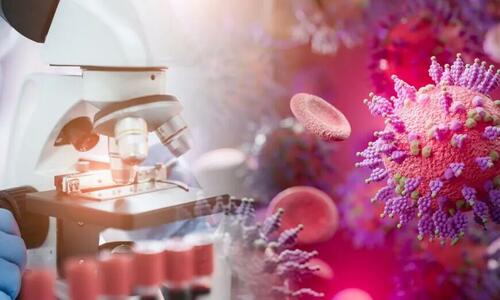COVID-19 mRNA Vaccines Reduce Immune Response To Other Infections, Potential Concern Of Immune Deficiency
Authored by Marina Zhang via The Epoch Times (emphasis ours),
A recent study on the immune effects of Pfizer’s COVID-19 mRNA vaccine has scientists raising concerns over vaccine-acquired immune deficiencies.

Vaccine-acquired immune deficiency syndrome (VAIDS) is a new colloquial term coined by researchers and health practitioners since the COVID-19 vaccine rollout. Though not recognized as a medical condition, some experts believe the COVID-19 vaccines may impair or suppress immune responses.
While the new study does not use the term VAIDS, the researchers recognized “a general decrease in cytokine and chemokine responses” to bacteria, fungi, and non-COVID viruses in children after COVID-19 vaccination.
“Our findings suggest SARS-CoV-2 mRNA vaccination could alter the immune response to other pathogens, which cause both vaccine-preventable and non-vaccine-preventable diseases,” the authors of the paper published in Frontiers in Immunology wrote.
“This is particularly relevant in children as they: have extensive exposure to microbes at daycare, school, and social occasions; are often encountering these microbes for the first time; and receive multiple vaccines as part of routine childhood vaccination schedules.”
The researchers from the Murdoch Children’s Research Institute and Royal Children’s Hospital in Melbourne, Australia, took blood samples of 29 children, both prevaccination and after two Pfizer mRNA doses.
They found that blood samples postvaccination had a lower cytokine response to non-COVID pathogens compared to prevaccination. This reduced immune response was particularly persistent for non-COVID viruses. Blood samples taken at six months showed some children still had low responses for hepatitis B virus proteins and proteins that mimic a viral infection; however, cytokine responses had increased for bacterial exposures.
Immune responses to COVID-19 proteins—including spike proteins and their S1 and S2 subunits—and nucleocapsid proteins remained high after vaccination.
Professor Retsef Levi, specializing in risk management and health systems at the Massachusetts Institute of Technology (MIT), posted on X (formerly known as Twitter) that the study “adds to cumulative evidence suggesting adverse immune alteration” by COVID-19 vaccination. Family physician Dr. Syed Haider and immunologist and computational biologist Jessica Rose both connected the study’s findings to VAIDS.
Rebuttal
Marc Veldhoen, an immunologist specializing in T-cell responses and the head of a laboratory at Instituto de Medicina Molecular in Portugal, challenged the study’s findings.
In an X thread, Mr. Veldhoen highlighted flaws in the study, including the lack of controls, meaning children who were not vaccinated, to compare against the subject group on their innate immune responses to other pathogens.
“Without a non-vaccinated control group, at least another vaccine control group (to claim specificity), much larger numbers of subjects, and cellular composition data, [the study authors’] conclusion is speculation, and unlikely to hold,” Mr. Veldhoen wrote.
Accumulation of Studies Suggesting Decreased Immunity After Vaccination
The study is one of many suggesting declined immune response after COVID-19 vaccination.
A preprint study in 16 adults inoculated with the Pfizer mRNA vaccines had similar findings of a reduced innate immune response in participants exposed to pathogenic fungi. The same paper also found long-term changes in innate immune cells.
The Epoch Times reported on a January study out of Germany that showed multiple mRNA vaccinations induce a “class switch” in the type of antibodies formed against the spike protein and other COVID-19 proteins.
Read more here…
Tyler Durden
Fri, 09/08/2023 – 05:00
via ZeroHedge News https://ift.tt/3Sq1yUI Tyler Durden